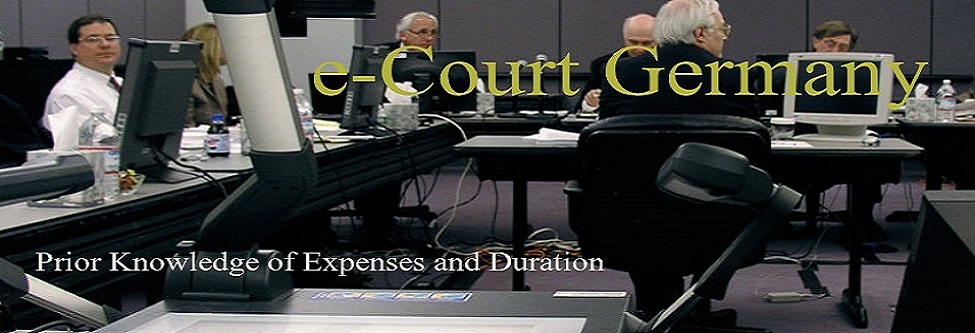SUMMARY
The European Small Claims Procedure established by this Regulation is intended to improve access to justice by simplifying cross-border small claims litigation in civil and commercial matters and reducing costs. "Small claims" are cases concerning sums under EUR 2 000, excluding interest, expenses and disbursements (at the time when the claim form is received by the competent court). Judgments delivered under this procedure are recognised and enforceable in the other Member States without the need for a declaration of enforceability. The procedure is optional, offered as an alternative to the possibilities existing under the national laws of the Member States. It will be applicable from 1 January 2009 in all EU Member States except Denmark.
STARTING THE PROCEDURE
The European Small Claims Procedure, for which no lawyer is necessary, follows a series of steps:
Filing the claim. To file a claim for a sum less than EUR 2 000, the claimant fills in a standard claim form (Form A, provided in Annex I to the Regulation), giving details of the claim, the sum demanded, etc., and lodges it with the competent court by any means of communication acceptable to the Member State in which the action is taken. If the claim is outside the scope of the Regulation (see below), the court will notify the claimant to that effect; if the claim is not withdrawn, the court will proceed with it in accordance with the relevant applicable procedural law in that Member State.
Correcting and/or completing the claim form. If the claimant has not provided enough information, the court will send him a Form B (Annex II) asking for the missing information. The claim will be rejected if the claimant fails to complete or correct the claim in the time specified, or if it is manifestly unfounded or inadmissible.
Notifying the defendant. Once the court has received the properly filled in claim form, it prepares a standard answer form (Form C, Annex III). This, together with a copy of the claim and, where applicable, the supporting documents, is served on the defendant by post with dated acknowledgement of receipt within 14 days.
The defendant replies within 30 days. The defendant then has 30 days to prepare and return his response, counting from the date of service of the answer form.
The defendant's response is forwarded to the claimant. Within 14 days of receiving the defendant's response, the court forwards a copy of it to the claimant, with any relevant supporting documents.
Any counterclaim submitted by the defendant (using Form A) is served on the claimant in the same way as the original claim was served on the defendant (see above). The claimant has 30 days to respond. If the sum of the counterclaim is more than EUR 2 000, both claim and counterclaim will be dealt with in accordance with the relevant procedural law applicable in the Member State in which the action is taken (and not in accordance with the European Small Claims Procedure).
Judgment is given in 30 days. The court must give judgment within 30 days of receipt of the response from the defendant (or claimant, if there is a counterclaim). It can, however, decide to ask for further information (the parties have 30 days to reply) or to take evidence in the matter or to summon the parties to an oral hearing (within 30 days: see also below); in these cases, the court gives its judgment within 30 days of receiving the information or holding the hearing. If the parties do not reply in time, the court will still give its judgment. Judgments are recognised and enforced in the other Member States, and cannot be reviewed as to substance in the Member State of enforcement. At the request of one party the court will issue a certificate of judgment (without further cost), using Form D (Annex IV).
Taking evidence. The court determines the extent of the evidence necessary for its judgment and the means of taking it, using the simplest and least burdensome method.
Enforcement of the judgment. This is governed by the law of the Member State in which the judgment is enforced. The party seeking enforcement produces an original copy of the judgment, and of the certificate (Form D) translated by a qualified person into the language, or one of the languages, of the Member State of enforcement. The party is not required to have an authorised representative or a postal address in the Member State of enforcement, other than with agents competent to carry out the enforcement procedure. The authorities cannot require any security, bond or deposit on the grounds that the claimant is a foreign national or is not domiciled or resident in the Member State of enforcement.
REFUSAL OF ENFORCEMENT AND APPEALS
The court in the Member State of enforcement can, at the request of the defendant, refuse to enforce the judgment when:
•the judgment is irreconcilable with an earlier judgment between the same parties in the same cause of action;
•the earlier judgment was given in the Member State of enforcement or fulfils the conditions necessary for its recognition there;
•the irreconcilability of the judgments was not and could not have been raised as an objection in the proceedings in the court where the judgment in the European Small Claims Procedure was given.
When a party has challenged or applied for a review of a judgment given in the European Small Claims Procedure, the competent authority in the Member State of enforcement can limit the enforcement procedure to protective measures, make enforcement conditional on some security, or, in exceptional circumstances, stay the enforcement proceedings.
Appeals against a judgment given in the European Small Claims Procedure are governed by the procedural law of the Member States, which must by 1 January 2008 inform the Commission whether an appeal is available under their procedural law and in what court. The Commission will make that information publicly available through the Official Journal of the European Union and any other appropriate channel.
The defendant can apply to the court that gave a judgment for a review when:
•the claim form or summons to an oral hearing was not served by a method with proof of receipt by him personally;
•service was not effected in time for him to prepare his defence, without any fault on his part;
•he was prevented from objecting to the claim by reasons of force majeure or due to extraordinary circumstances, without any fault on his part.
In any of these cases, the defendant is expected to act promptly. When a review is justified, the original judgment becomes null and void.
Role of the courts and provisions relating to languages, hearings and costs
The court does not require the parties to make any legal assessment of the claim. If necessary, it informs the parties about procedural questions, and whenever appropriate it seeks to reach a settlement between them.
Languages and translations. The claim must be submitted in the language, or one of the languages, of the court, as must the response, any counterclaim, the description of supporting documents, etc. The court can require a translation of a document received in another language only if that document seems to be necessary for giving the judgment. If a party refuses to accept a document because it is in a language he does not understand or a language other than one of the official languages of the Member State addressed, the court will notify the other party so that he can supply a translation.
Oral hearings. The court will hold an oral hearing only if this appears to be necessary or if requested by one of the parties. The request may be refused if an oral hearing is obviously not necessary for the fair conduct of the proceedings. The hearing may be conducted through videoconference or other communication technology.
Costs. The costs of the proceedings are borne by the unsuccessful party.
SCOPE OF THE REGULATION
The European Small Claims Procedure applies to cross-border cases, that is, cases in which at least one of the parties is domiciled or habitually resident in a Member State other than the Member State of the court where the action is brought. Domicile is determined in accordance with Articles 59 and 60 of EC Regulation No 44/2001 on jurisdiction and the recognition and enforcement of judgments in civil and commercial matters. In order to determine whether a party is domiciled in the Member State of the court, it applies its internal law; if the party is not domiciled in that Member State, the court determines whether he is domiciled in another Member State by applying the law of that Member State (Article 59). Companies and legal persons are domiciled in the place of their statutory seat, their central administration or their principal place of business (Article 60).
The Regulation does not apply to revenue, customs or administrative matters, to the liability of the State (acta jure imperii), or to:
•the status or legal capacity of natural persons;
•matrimonial regimes, maintenance obligations, wills and successions;
•bankruptcy, compositions and similar proceedings;
•social security;
•arbitration;
•employment law;
•tenancies of immovable property, except for monetary claims;
•violations of privacy and of rights relating to personality, including defamation.
Final provisions
The European Commission will report to the European Parliament, the Council and the Economic and Social Committee on the application of the Regulation by 1 January 2014. It is assisted by a committee.
The Regulation applies from 1 January 2009 in all Member States except Denmark. Article 25, which requires the Member States to communicate certain information (relating to jurisdiction, means of communication, appeals etc.) to the Commission, applies from 1 January 2008.
Source: European Commission
Arie
European Small Claims Procedure

-
TOPICS:
- HOW IT WORKS
- home
- preliminary information
- introduction
- SMALL CLAIMS COURT
- e-Court, how it works
- civil law
- standard procedure
- appeal process
- hearings
- a legally binding verdict
- member of e-Court
- join e-Court
- terms, rules & regulations
- find a lawyer
- ( demo : Preliminary info )
- ( demo : The Standard Procedures )
- ( demo : The Appeal Procedures )
- OFFLINE NETWORKING
Endorsements ( 1/2000 + ):
- Miller Thomson LLP
Gerald Chipeur, QC, Partner Calgary, Alberta - Adair
Morse LLP
John Adair, Toronto, Canada Area Law Practice - Bart
Law
Jaqueline Bart, Canadian Immigration Law - Clancy P.C. & Brion Raffoul
Paula Clancy, Managing Attorney at Clancy P.C.& Brion Raffoul, Ottawa Legal Services - Ennis Milne - Barristers & Solicitors
Toronto, Ontario, Law Practice - Partner,
Gilbertson Davis Emerson LLP
Past President, Ontario Bar Association - George A.
Bougadis
Toronto, Ontario, Canada Law Practice - Rick
B
Calgary, Canada Area Industry Law Practice -
Patrick Cormier
Canadian Centre for Court Technology Montreal, Quebec, Canada - Jonathon Baker
Toronto, Canada Area Law Practice - Patricia M. Swerhone
Waters and Associates, Barristers & Solicitors, Toronto - Kenneth J. Byrne
Immigration and Real Estate Lawyer at Benson Buffett, Newfoundland And Labrador - Patricia M. Swerhone
Waters and Associates, Barristers & Solicitors, Toronto - Kenneth J. Byrne
Immigration and Real Estate Lawyer at Benson Buffett, Newfoundland And Labrador - Justice Clark
Partner at Simmons Da Silva + Sinton LLP, Toronto - Stanley Potter
Owner, Stanley J. Potter, Barrister & Solicitor, Toronto - Beth A. Sheppard
Shareholder/Director, Benson Buffett PLC Inc., Newfoundland And Labrador - Tony Lafazanis
Personal injury lawyer at Tony Lafazanis, Toronto, - Steve A.
Lawyer at Defend Your Points - Traffic Ticket Lawyers, Toronto - Tina Schultz
Owner ~ Broken Link Divorce Planning, Calgary - Joseph W.J. F.
General counsel at Law Office, New Brunswick, Canada - Diana McGuire
Foord and Davies Law Firm, Ottawa - Anushika Anthony
Personal Injury Lawyers, Toronto - James A. Carr
Barrister and Solicitor at Carr Quinn King, Edmonton - Amy M. Crosbie
Partner at Curtis, Dawe, Newfoundland And Labrador - Justice Clark
Partner at Simmons Da Silva + Sinton LLP, Toronto - Stanley Potter
Owner, Stanley J. Potter, Barrister & Solicitor, Toronto - Beth A. Sheppard
Shareholder/Director, Benson Buffett PLC Inc., Newfoundland And Labrador - Tony Lafazanis
Personal injury lawyer at Tony Lafazanis, Toronto, - Joseph W.J. F.
General counsel at Law Office, New Brunswick, Canada - Diana McGuire
Foord and Davies Law Firm, Ottawa - Anushika Anthony
Personal Injury Lawyers, Toronto - James A. Carr
Barrister and Solicitor at Carr Quinn King, Edmonton - Abigail Wiley
TimberWest Forest Corp., Vancouver - Anna L.
University of Ottawa Law School - David M. Woodward
Partner at Lerners LLP, London - Amy M. Crosbie
Partner at Curtis, Dawe, Newfoundland And Labrador - Justice Clark
Partner at Simmons Da Silva + Sinton LLP, Toronto - Stanley Potter
Owner, Stanley J. Potter, Barrister & Solicitor, Toronto - Victor Artemiev
Vice President (investment & business development) at Eurasian Development & Management Company - Robin Austin
Executive Strategy & Planning, Market Strategy Marketing Business Development Strategy Marketing Business - David Bagatelle
Executive Vice President and New York Metro Market President at Provident Bank New York - Stuart Bagnell
Internal Communications Manager Europe lastminute.com - PK Bala
Chief Operating Officer at Teleplan International - Joanne Dereta
Principal at Stonegate Private Counsel - Alan Gilmore
President at Ariel Group International - ( Endorsements continued.....)















